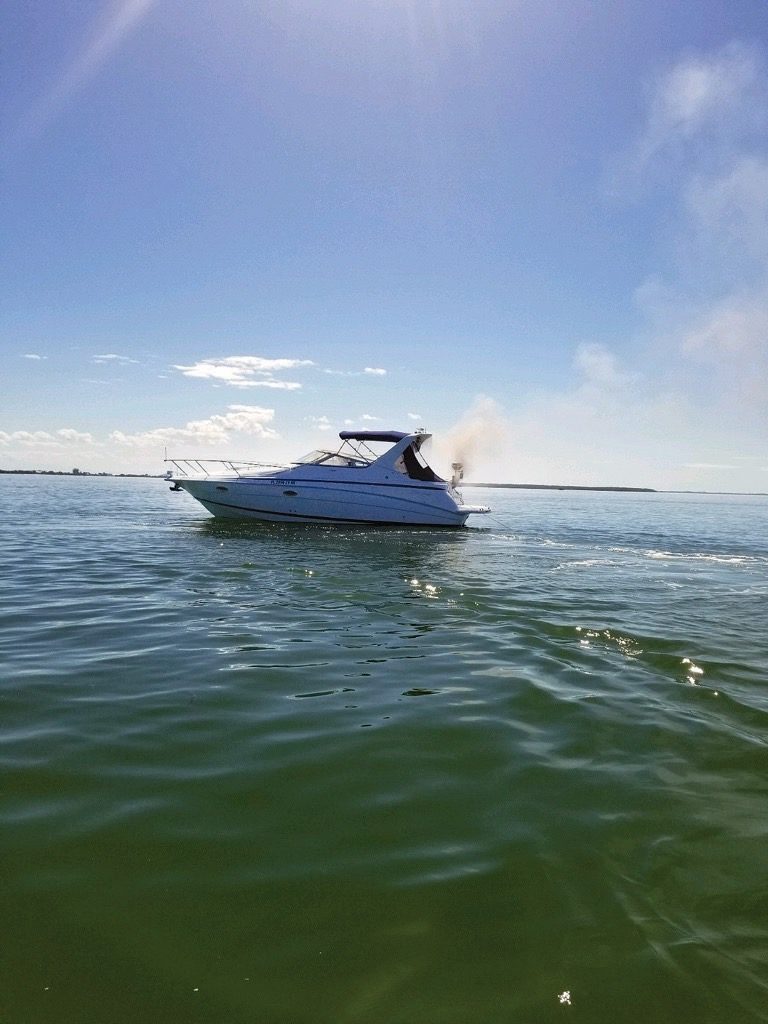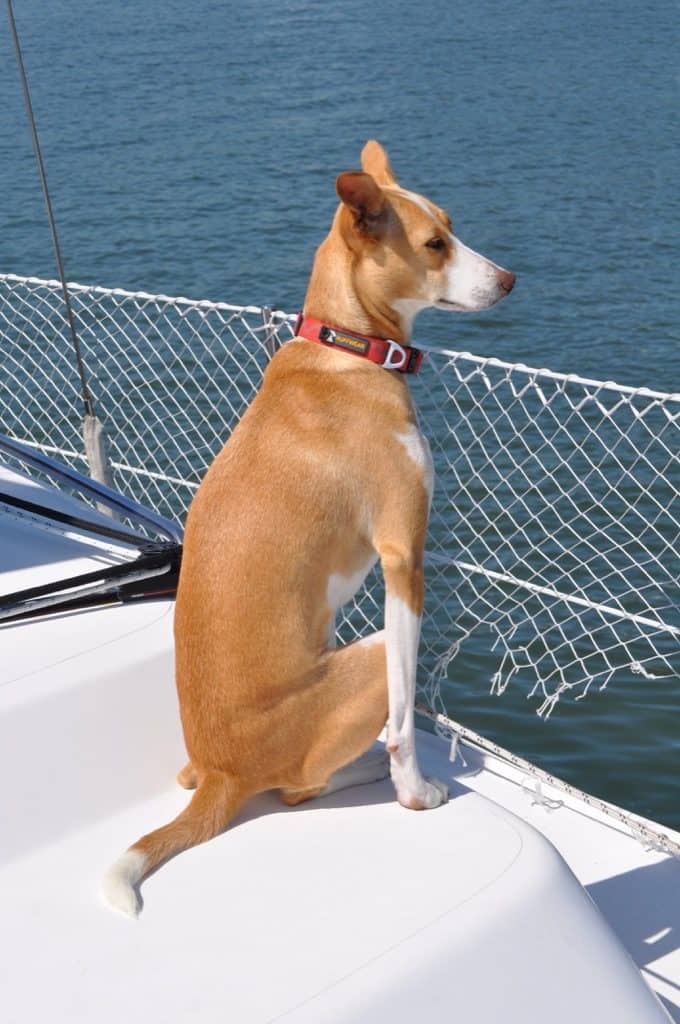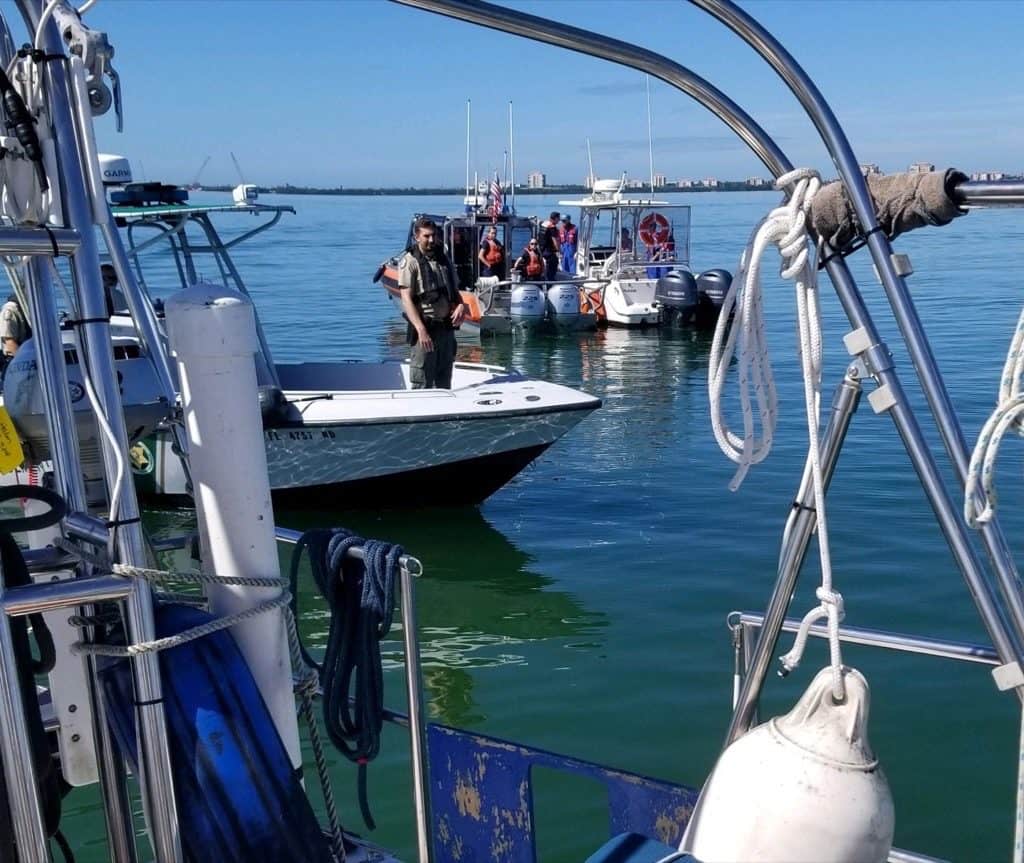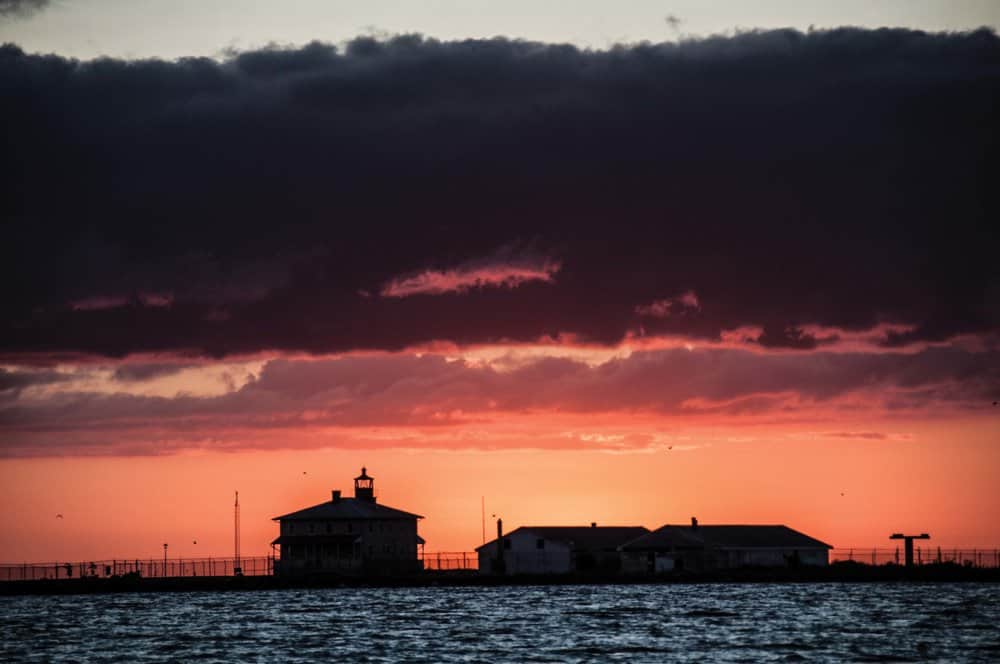Wherein the author learns something about emergencies without having one.
This is the story of how I came to experience an onboard emergency without actually having to have one myself. The event taught me a few good lessons, which I will share with you, but not in a long-winded heavily didactic way, though if you don’t want to know you can just skip to the last paragraph.
Here’s the story: It was a beautiful, warm, and spotless February day in Florida, and I was steering Moment of Zen along the channel that parallels the Sunshine Skyway Bridge, when I noticed that the small cruiser coming along the intersecting channel had suddenly pulled off and stopped. Fishing maybe? (The ways of fishermen eternally elude me.) Not fishing. Great clouds of black smoke billowed from the aft deck area and, a few seconds later, a man climbed onto the forward deck with a small fire extinguisher in hand. He pulled the tab, then slowly, cautiously, walked toward the stern as he sprayed in the direction of the smoke. The extinguisher was soon empty and he returned to the bow and stood watching the smoke. I had reached the intersecting channel by this time and slowed to a stop as I came near the boat.

“Have you called the Coast Guard?” I called over to him.
“No, would you do that?” he called back.
So, I pulled Zen a bit past the smoking boat and picked up the mic.
Uh-oh, I thought suddenly, is this a pan-pan, a sécurité or a mayday? Not mayday. The boat hadn’t blown up. I opted for pan-pan. As an aside, I have always found pan-pan tricky to pronounce, because you don’t want to make it sound too French, which seems pretentious and too much like those things cheerleaders wave at football games. On the other hand, you don’t want it to sound like cookware either. I aimed for somewhere in between, which probably rendered it incomprehensible.
Then I thought, “How do I put this?” I opted for: “This is the vessel Moment of Zen calling a pan-pan for a boat with smoke pouring out the back. We’re on the ICW channel, just, uh, west, of the Dick Misener Bridge.” It wasn’t pretty, but I felt it described the problem.
In any case, it succeeded in drawing a response from the Coast Guard, which was to ask, as it always does first, how many people were on board and whether they had life jackets on.
“One, apparently,” I said, “and no,”
The next questions were “what was our position” and “was I in contact with the person on the boat.” I said yes, I was, and then I read the latitude and longitude off the chartplotter. As another aside, I’m not that confident in my chartplotter, which always feels a little bit off to me, but my iPad, which seems to me to have a better grasp on things generally, had earlier in the day overheated in the sun and shut down because I had my Bimini down, for reasons I won’t go into. Though that was also why, as luck would have it, Zen’s Canine Security Chief Bindi and her enforcer companion, Sammy, were down below in the shade of the cabin and not up on deck trying to put out the fire by barking at it.
As I was having this conversation with the Coast Guard dispatcher and watching the boat’s occupant, like magic, a Sir Galahad on a jet ski appeared out of nowhere and made for the smoking boat. He directed the occupant to climb aboard, then headed for Moment of Zen. There he paused long enough for the man to climb aboard.
“I wouldn’t stay too close in case she goes,” the knight errant said, and rode off into the sunset, metaphorically speaking.
“Excuse me,” I said, interrupting the Coast Guard dispatcher, “I need to help the occupant aboard.” The situation, I felt, could have used a more complete explanation, like how did he get off the boat and how did he get aboard, but oddly the dispatcher didn’t seem curious in that.

“Right,” I said, when he was aboard, and returned to the mic. “Here’s the occupant,” I said and, with some relief, handed over the mic and the conversational responsibility. I then heeded Galahad’s advice and moved Zen farther up the channel, clear of the explosion zone, if there should be one.
That done, I went below to explain the situation to the security chief and navigator trainee. On hearing what they took to be a pirate/terrorist/anarchist on deck, they had naturally begun to bark and howl and demand his immediate surrender. After some close reasoning on my part, they grudgingly agreed to become intermittently quiet. I accepted the compromise and returned to the matter at hand.
By this time, the Coast Guard had run out of questions, so the occupant turned to me and introduced himself. “Hi, I’m Bill,” he said. He dug out his card and handed it to me. “Hi, I’m Jody,” I said, and we shook hands. I couldn’t help feeling that this was slightly silly under the circumstances, though I am admittedly ignorant of the procedure for taking on passengers from smoking boats. Maybe a handshake is the standard procedure.
“I was taking the boat over to Salt Creek to get some work done for a friend,” he said, not a little ruefully. “The engine suddenly cut out, and then she started smoking. I didn’t want to lift up the door to the engine compartment.” “Gas?” I asked. “Yes,” he replied, “It could have been a disaster.”
Bill said he had been trying to decide about jumping into the water when the knight on a jet ski had come along to solve the problem. “If I’d had my dog with me, we would have already been in the water” Bill told me a few weeks later when I bumped into him at a marina Tiki bar.
Though now, we stood silently in the rising heat and watched thick black smoke continue to pour out of the stern of the abandoned boat. We could smell burning fiberglass and wires. I tried to calculate whether I had moved far enough away to avoid flying debris if the worst happened.
Pan-Pan Etymology
Pan-pan comes from the French word panne (pronounced “pahn”), meaning breakdown.
In English it is sometimes pronounced like the cookware. Similarly, mayday is derived from the French m’aidez, or “help me.”
In the hierarchy of Bad Things, mayday requires the most urgent response, as when someone’s life is in immediate danger. Pan-pan is less urgent, but still bad—a boat drifting into a shipping lane, for example. A third call, Sécurité, is used for non-life threatening navigational or meteorological warnings.
A few minutes into this fruitless occupation, I spied the flashing blue light of the Coast Guard boat coming down the channel from the west. Before it got to us, it paused to flag down an eastbound trawler. The trawler slowed and began a wide sweep around us, staying well outside of the channel. It knew from potentially exploding boats too. Meanwhile, the Coast Guard vessel, pulled up next to Zen. This naturally sent Zen’s security team into a near frenzy of alarm. I could picture them wheeling out the canon, Sammy waiting for Bindi’s command before lighting it off. I quickly introduced Bill to the Coast Guard as the man to talk to and ducked below to renegotiate a cease-fire. Sammy surrendered quickly, but Bindi held out for another biscuit. “Really,” I thought to myself as I returned to the helm, “I wouldn’t have time for an emergency of my own.”
About this time, two more boats arrived. The first was a Florida Fish and Wildlife Commission vessel, which came along Zen’s other side. At that point, Sammy and Bindi decided the jig was up and went back to sleep. The second was a City of St. Petersburg fire boat, which headed straight for the smoking vessel, apparently unconcerned that it could blow up at any moment.
At once, the crew began hosing it down with a small ocean of fire-retardant.
Sometime during one of my several absences below, Bill must have called Eckerd College Rescue Service, because now that boat joined our expanding flotilla, and we all bobbed quietly under the hot sun, watching the smoke and the fireboat.
Finally, the black smoke dwindled to a few tendrils of gray, and two members of the fire boat clambered aboard and opened the engine compartment. After another application of fire retardant, they called it a day and the party slowly broke up. The FWC offered to take Bill to a nearby marina. The Coast Guard wandered back up the channel. The fireboat followed. And the Eckerd College Rescue Boat took the damaged, but not-blown-up, boat in tow. Suddenly, we were all alone.
The excitement was over. I put Zen’s engines into gear and headed up the channel too, my first not-onboard emergency under my belt.

So, what did I learn? Carry a lot of fire extinguishers. Those little ones don’t last long. Also don’t forget where you put them. If you have a gasoline engine, don’t feed the fire by opening the engine compartment. Know how to call in an emergency. Practice saying pan-pan. Be prepared to leave the boat in a hurry. That goes for passengers and pets, as well. Be sure you can drop your dinghy double quick, though you may not have time to even do that. Tell passengers where the emergency equipment is. And the life jackets. Finally, keep the canon away from Bindi. She’s a mad-woman.




